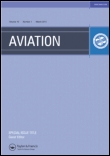
Aviation
Scope & Guideline
Elevating aerospace knowledge for a brighter tomorrow.
Introduction
Aims and Scopes
- Aviation Safety and Risk Management:
Research in this area emphasizes methodologies and frameworks for enhancing safety protocols, risk assessment models, and accident investigation processes in aviation. - Aerospace Engineering and Technology Development:
This includes studies related to aircraft design, aerodynamics, materials science, and innovative technologies like unmanned aerial vehicles (UAVs) and advanced propulsion systems. - Human Factors and Training in Aviation:
Focuses on the human element in aviation, including training methodologies for air traffic controllers and pilots, crew resource management, and ergonomics. - Sustainability and Environmental Impact:
Investigates the environmental implications of aviation operations, including fuel efficiency, emissions reduction, and the use of alternative fuels. - Data Analytics and Machine Learning Applications:
Explores the application of data science and machine learning techniques in various aviation contexts, such as predictive maintenance, operational efficiency, and traffic management. - Air Transport Economics and Management:
Examines the economic aspects of aviation, including airline business models, market dynamics, and recovery strategies in response to global challenges.
Trending and Emerging
- Machine Learning in Aviation:
The application of machine learning techniques for predicting safety outcomes, optimizing operations, and enhancing decision-making processes has surged, indicating a significant trend towards data-driven methodologies. - Sustainable Aviation Practices:
Research focusing on sustainability, including biofuels, emissions reduction strategies, and energy-efficient technologies, has become increasingly prominent as the industry seeks to address environmental concerns. - Unmanned Aerial Vehicles (UAVs) and Autonomous Systems:
The exploration of UAVs, including their applications in various sectors such as surveillance, delivery, and agriculture, has gained substantial attention, showcasing the growing relevance of autonomous aviation technologies. - Digitalization and Automation in Aircraft Operations:
Emerging themes around digital transformation, including the use of advanced simulations, automated systems, and digital maintenance solutions, reflect the industry's shift towards integrating technology in operational processes. - Human Factors and Crew Performance Optimization:
An increased focus on the psychological and ergonomic factors influencing crew performance and safety management highlights the importance of human factors in aviation operations.
Declining or Waning
- Historical Analysis of Aviation Incidents:
Research focused on historical accident investigations and their implications for current practices has become less frequent, indicating a shift towards more proactive safety measures rather than retrospective analyses. - Basic Aerodynamics Studies:
Although fundamental aerodynamic studies were once prevalent, there seems to be a declining interest in basic theoretical aerodynamics as research shifts towards applied and computational studies. - Conventional Fuel Technologies:
There is a noticeable decrease in research related to traditional aviation fuel technologies, reflecting a broader industry trend towards sustainable and alternative fuel research. - Regulatory Compliance Studies:
Studies focusing on regulatory frameworks and compliance issues appear to be waning, likely due to an increasing focus on innovative practices and technologies that go beyond mere compliance.
Similar Journals

Aerospace Research in Bulgaria
Advancing aerospace innovation in Bulgaria and beyond.Aerospace Research in Bulgaria is a prestigious academic journal dedicated to advancing the field of aerospace engineering and technology. Published by the BULGARIAN ACADEMY OF SCIENCES, SPACE RESEARCH & TECHNOLOGY INSTITUTE (SRTI-BAS), this journal serves as a key platform for researchers, engineers, and professionals seeking to share original research, innovative technologies, and critical reviews related to aerospace applications. With the ISSN 1313-0927 and E-ISSN 2367-9522, the journal aims to contribute significantly to the global aerospace community. Although the journal operates under a traditional access model, it emphasizes the importance of research collaboration and disseminating knowledge in the ever-evolving aerospace sector. The editorial team is committed to maintaining high standards in peer review, making it an essential resource for academics and practitioners alike. Located at ACAD. GEORGI BONCHEV STR., SOFIA 1113, BULGARIA, this journal not only highlights Bulgarian contributions to aerospace research but also aims to engage with a broader international audience, fostering advances that propel the industry forward.

Journal of Aerospace Information Systems
Exploring New Frontiers in Aerospace EngineeringJournal of Aerospace Information Systems, published by the American Institute of Aeronautics and Astronautics, is a premier scholarly platform dedicated to advancing the interdisciplinary field of aerospace information systems. With a focus on innovative research and practical applications, this journal supports the dynamic integration of aerospace engineering, computer science, and electrical engineering. Positioned in Q2 quartiles for 2023 in its respective categories, it ranks notably in Aerospace Engineering (#52/153) and Electrical and Electronic Engineering (#357/797), indicating its significant influence within the scientific community. Research published within its pages addresses a diverse range of technological advancements and applications that are vital for the development of contemporary aerospace systems. As an open-access journal, it facilitates broader dissemination of knowledge, allowing researchers, professionals, and students to engage with cutting-edge discoveries and methodologies. With its competitive impact and commitment to fostering innovation, the Journal of Aerospace Information Systems is an essential resource for anyone involved in the burgeoning field of aerospace technology.
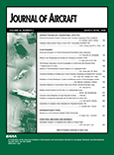
JOURNAL OF AIRCRAFT
Charting New Horizons in Aviation Research.JOURNAL OF AIRCRAFT, published by the American Institute of Aeronautics and Astronautics, stands at the forefront of aerospace engineering research, serving as a critical resource for researchers, professionals, and students in the field. With a proud publication history dating back to 1964 and continuing through 2024, the journal has established itself as a leading forum for innovative studies and advancements in aircraft design, technology, and utilization. Notably, it holds a prestigious Q1 ranking in Aerospace Engineering and is positioned at the 75th percentile among its peers. As a non-open access publication, it offers a subscription-based model, ensuring high-quality content disseminated to a discerning audience. The ISSN 0021-8669 and E-ISSN 1533-3868 provide easy reference for those seeking to engage with pioneering research in aviation and aircraft systems. Researchers and practitioners alike will find valuable insights and comprehensive analyses in this esteemed journal that continually shapes the development of the aerospace industry.
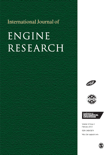
International Journal of Engine Research
Elevating Standards in Global Engine ResearchWelcome to the International Journal of Engine Research, an esteemed publication dedicated to advancing the fields of Aerospace Engineering, Automotive Engineering, Mechanical Engineering, and Ocean Engineering. Published by SAGE Publications Ltd and based in the United Kingdom, this journal has earned a prestigious reputation, consistently ranking in the Q1 quartile in several engineering categories as of 2023. The journal's impact is evident through its high Scopus rankings, positioning it within the top 25% of global research in Aerospace and Automotive engineering, and within the top 20% for Mechanical engineering. With a commitment to publishing rigorous, peer-reviewed research from 2000 to 2024, the International Journal of Engine Research plays a vital role in fostering innovation and collaboration within the engineering community. Although this journal does not offer open access, it remains a critical resource for researchers, industry professionals, and students striving to deepen their understanding in these dynamic fields.
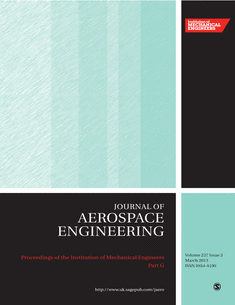
PROCEEDINGS OF THE INSTITUTION OF MECHANICAL ENGINEERS PART G-JOURNAL OF AEROSPACE ENGINEERING
Connecting Theory and Practice in Aerospace InnovationPROCEEDINGS OF THE INSTITUTION OF MECHANICAL ENGINEERS PART G-JOURNAL OF AEROSPACE ENGINEERING, published by SAGE PUBLICATIONS LTD, stands as a pivotal resource for those immersed in the disciplines of aerospace and mechanical engineering. With an ISSN of 0954-4100 and E-ISSN of 2041-3025, this journal not only contributes to the academic community but also reflects a robust commitment to advancing knowledge within these fields. Operating from the United Kingdom, it has garnered a respectable reputation, evidenced by its category quartiles—ranking Q3 in both Aerospace Engineering and Mechanical Engineering as of 2023. Established in 1989, the journal has evolved substantially over the years, serving as a platform for groundbreaking research and innovative methodologies. Researchers, professionals, and students alike will find a wealth of insights that foster collaboration and advance the frontiers of engineering. Although currently not available as an Open Access publication, the journal remains a critical reference point for those looking to deepen their understanding and contribute to ongoing developments in aerospace technology.
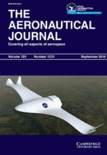
AERONAUTICAL JOURNAL
Exploring the frontiers of flight and technology.Aeronautical Journal, published by Cambridge University Press, is a premier scholarly journal dedicated to advancing the field of aerospace engineering. With a notable impact factor, this journal holds a strong position in the academic community, ranked #53 out of 153 in the Scopus category of Aerospace Engineering, placing it in the 65th percentile. The journal has been providing a platform for groundbreaking research since its inception in 1969, and continues to be a vital resource for researchers, professionals, and students involved in aeronautics. As a Q2 journal in the 2023 Aerospace Engineering category, it offers high-quality articles that cover a range of topics within the discipline, contributing to the ongoing discourse and innovation in aerospace technologies. Although not an open-access journal, it remains accessible to a vast readership through institutional subscriptions and partnerships. The Aeronautical Journal is a crucial publication for those seeking to stay at the forefront of aerospace research and development.

International Journal of Aviation Aeronautics and Aerospace
Exploring Frontiers in Aeronautics and Engineering ExcellenceInternational Journal of Aviation Aeronautics and Aerospace, published by Embry-Riddle Aeronautical University, serves as a pivotal platform for the dissemination of innovative research in the fields of aerospace engineering, civil and structural engineering, and safety, risk, reliability, and quality. With an ISSN of 2374-6793 and designated as an open access journal since 2014, it enables unhindered global access to its scholarly content, fostering collaboration among researchers, professionals, and students in the aviation sector. The journal's presence spans from 2014 to 2024 and is recognized within the Q3 category across multiple engineering domains according to recent metrics. Despite its emerging status, it holds respectable rankings in Scopus, demonstrating its relevance and contribution to the academic community, particularly in dynamic engineering sectors. It is an essential resource for anyone looking to enhance their understanding of advancements and challenges in aviation and aerospace solutions.

Maritime Business Review
Driving Progress in Maritime Transportation and ManagementMaritime Business Review, published by Emerald Group Publishing Ltd, is a leading academic journal dedicated to advancing knowledge in the fields of maritime business, transportation, and management. With an ISSN of 2397-3757 and E-ISSN of 2397-3765, this journal has established itself as a vital resource for researchers and practitioners alike, particularly noted for its contribution to the domains of Business and International Management, Management of Technology and Innovation, Strategy and Management, and Transportation. The journal is ranked in the prestigious Q2 quartile in each of these categories as of 2023, reflecting its impactful research and relevance in contemporary academic discourse. Although currently not an Open Access journal, it offers robust access options through institutional subscriptions—making its rich repository of cutting-edge research readily available to scholars and professionals. Since its inception in 2016 and continuance to 2024, Maritime Business Review has emerged as an essential platform for both emerging and established academics to share innovative insights and enhance collaborative efforts within the international maritime business community.
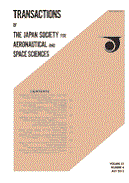
TRANSACTIONS OF THE JAPAN SOCIETY FOR AERONAUTICAL AND SPACE SCIENCES
Bridging Theory and Practice in AeronauticsTRANSACTIONS OF THE JAPAN SOCIETY FOR AERONAUTICAL AND SPACE SCIENCES is a distinguished journal published by the Japan Society for Aeronautical and Space Sciences, focusing on the latest advancements and research in the fields of aerospace engineering and space and planetary science. With a broad range covering theoretical studies, practical applications, and experimental research, this journal serves as a vital platform for researchers, professionals, and students keen to explore the intricacies of aeronautics and space technologies. Although currently closed to open access, the journal maintains a significant presence in the academic community, boasting a 2023 Scopus ranking of Q3 in both of its respective fields and offering insights that contribute to ongoing discussions and innovations in aerospace. Since its inception in 1969 and with publications extending to 2024, the journal not only reflects the evolving landscape of aeronautics and space sciences but also encourages discourse that paves the way for future breakthroughs. For your engagement and contributions to this dynamic field, the TRANSACTIONS OF THE JAPAN SOCIETY FOR AERONAUTICAL AND SPACE SCIENCES stands as an essential resource.
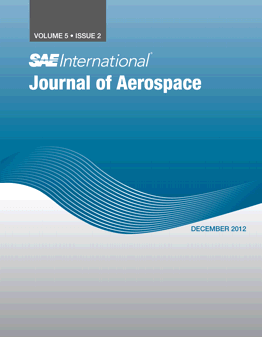
SAE International Journal of Aerospace
Fostering the Future of Aerospace Technologies.The SAE International Journal of Aerospace, published by SAE International, serves as a critical platform for innovative research and advancements within the field of aerospace engineering. With an ISSN of 1946-3855 and an E-ISSN of 1946-3901, this esteemed journal contributes significantly to the body of knowledge in the aerospace sector, boasting a convergence span from 2008 to 2024. While currently categorized in Q4 of Aerospace Engineering, the journal is dedicated to fostering emerging ideas, technologies, and methodologies that could eventually elevate its standing. Although it does not offer open access options, the journal ensures wide dissemination of its well-curated articles to aid researchers, professionals, and students in staying abreast of the latest developments and trends. Given its distinct focus and commitment to the aerospace community, the SAE International Journal of Aerospace plays an essential role in bridging theory and practice, making it a valuable resource for those within this vital and evolving field.